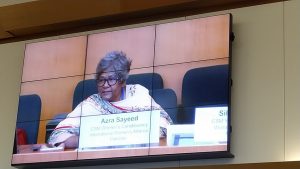PESHAWAR: The rights activists on Friday demanded of the government to start free mass coronavirus testing, especially for workers and farmers, besides ensuring their social protection.
The demand was made during a webinar organised by Pakistan Kissan Mazdoor Tehreek and NGO Roots for Equity here to mark the Labour Day.
The panelists included labour and peasant leaders and rights activists from different cities, including Dr Azra Talat Sayeed, Tariq Mehmood, Raja Mujeeb, Junaid Awan, Zahoor Joya and Wali Haider.
They said the Covid-19 pandemic had not only exposed the ineffectiveness of the capitalist system to deal with a crisis but also its ‘criminal tendency’ to disregard hunger and impoverishment suffered by the people at the current critical juncture prioritising profits over people.
The panelists said with the people not a priority, the country’s public health expenditure had never exceeded three per cent of the national budget.
They added that in the face of the pandemic, deregulation, privatisation and trade liberalisation policies were the structural reasons for the workers facing joblessness, financial instability and lack of health and other forms of social protection.
The panelists said that in the pre-neoliberal era, workers were given job protection, healthcare, education, shelter and other facilities.
They said under privatisation, even the right to permanent job security had been eroded and that was the basic reason for joblessness, poverty and hunger in the country, which had aggravated under the pandemic.
The panelists said during the Covid-19 crisis, factories and businesses had been closed leaving workers with acute economic hardship.
They said according to the provincial planning and development department, if the lockdown continued than 460,000 workers, including daily wagers and street vendors, would be left without a livelihood.
The panelists said in the Hattar Industrial zone, many hundreds of workers had already been laid off.
They claimed that the relief package provided by the federal and provincial governments was inaccessible for a majority of workers due to lack of registration and other handicaps.
The panelists said women faced increased domestic violence under the pandemic as well as economic hardship and hunger.
They said self-sufficiency and self reliance including food-self sufficiency was a critical element for national stability and development and that was only possible when workers had full access and control over resources and production to pave the way for a peaceful prosperous sovereign nation without the shackles of imperialism.
The panelists demanded of the government to guarantee incomes and benefits, cash grants and relief or the working people and nationalise public health system, respect democratic and human rights.
They said sanctions against Iran, Palestine and several other countries should be lifted.
Published in Dawn, May 2nd, 2020
https://www.dawn.com/news/1553901/free-virus-testing-for-workers-demanded

